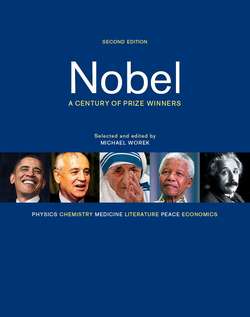Читать книгу Nobel - Michael Worek - Страница 51
На сайте Литреса книга снята с продажи.
ОглавлениеWoodrow Wilson (1856–1924)
1919 Peace
[For his] attempts to negotiate peace, with special reference to his speech “Fourteen Points,” aimed at achieving a lasting Peace after World War I, and which would be fundamental in establishing the League of Nations.
The son of a Presbyterian minister, the young Wilson grew up in a home governed by religious values and education. He attended Princeton University then finished his law degree at the University of Virginia.
In 1886 he received his doctorate from Johns Hopkins University). He was president of Princeton between 1902 and 1910, and he became known for his passionate ideas on the reformation of the educational system.
Politics began to attract the young professor, and the Democrats persuaded him to run for governor of New Jersey in 1910. He won the election and continued to bolster his national image as an independent, personal representative of the people. He made his views clear in his speeches and publications over the coming years, affirming in 1912 that “the business of government is to organize the common interest against the special interest.”
In 1912 Wilson was elected the 28th president of the United States in an election that split the Republican vote between William Howard Taft and Theodore Roosevelt. Wilson had run on a program called the New Freedom, which emphasized individualism and the rights of states.
In 1916, touting his legislation successes and the motto “he kept us out of the war,” Wilson was narrowly reelected, but World War I would nevertheless constitute the biggest test of Wilson’s presidency. American efforts slowly turned the tide in favor of the Allies, allowing them to achieve victory in Europe in 1918.
Wilson’s role on the international scene grew after the end of the war, and in January he went before Congress and the Paris Peace Conference with his Fourteen Points, the last of which would establish “a general association of nations… affording mutual guarantees of political independence and territorial integrity to great and small states alike.” Many of President Wilson’s ideas were implemented in the Versailles Treaty and the League of Nations, which earned him the Nobel Peace Prize in 1919. However, when the U.S. Senate refused to give its approval to the U.S. joining the League, Wilson, against the advice of his doctors, made an exhausting national tour in an attempt to stir up support for the Versailles Treaty. He nearly died from a stroke while campaigning in Pueblo, Colorado, and had to be nursed by his second wife, Edith Bolling Galt, until his death in 1924.
Although unable to attend the Nobel ceremony because of his failing health, President Woodrow Wilson had a telegram read by the American minister in which he praised the legacy of Alfred Nobel, where the “cause of peace and the cause of truth are of one family.”
